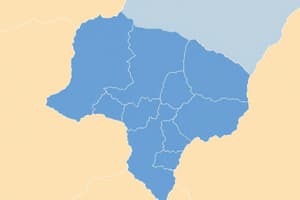Podcast
Questions and Answers
What is the historical background of Ghana's local government administration?
What is the historical background of Ghana's local government administration?
- Initiatives by the colonial government in 1859 to create small local jurisdictions for administrative purposes (correct)
- The establishment of a centralized system in the colonial era
- The exclusion of any local governance structures before independence
- The implementation of direct rule in Ghana in the 19th century
What was the local governance system in Ghana characterized by during the era of indirect rule?
What was the local governance system in Ghana characterized by during the era of indirect rule?
- Direct rule without any intermediary bodies
- Centralized administration under the colonial government
- Complete autonomy of local jurisdictions
- Combination of Municipal Councils and Native Authorities (correct)
What is the aim of decentralization in Ghana's local governance system?
What is the aim of decentralization in Ghana's local governance system?
- To transmit power to local governments and improve developmental performance (correct)
- To establish a unitary system of governance
- To increase central government control over local jurisdictions
- To eliminate local governments entirely for central control
How has decentralization impacted democratic development in Ghana?
How has decentralization impacted democratic development in Ghana?
What was the structure of Ghana's local governance system under indirect rule?
What was the structure of Ghana's local governance system under indirect rule?
How has decentralization in Ghana been influenced?
How has decentralization in Ghana been influenced?
What did the study by Honyenuga and Wutoh reveal about the role of Chiefs in Ghana's decentralized governance system?
What did the study by Honyenuga and Wutoh reveal about the role of Chiefs in Ghana's decentralized governance system?
What is the main purpose of the Unit Committee Model in Ghana's decentralization program?
What is the main purpose of the Unit Committee Model in Ghana's decentralization program?
What is one of the challenges faced by Ghana's local governance system according to the text?
What is one of the challenges faced by Ghana's local governance system according to the text?
Why is there a need for consensus building between Chiefs and local government actors in Ghana's decentralized governance system?
Why is there a need for consensus building between Chiefs and local government actors in Ghana's decentralized governance system?
What does the Unit Committee Model provide for local communities in Ghana?
What does the Unit Committee Model provide for local communities in Ghana?
How can Ghana address the challenges faced by its local governance system?
How can Ghana address the challenges faced by its local governance system?
Flashcards are hidden until you start studying
Study Notes
Local Governance System in Ghana
The local governance system in Ghana is a four-tier structure that includes 16 Regional Coordinating Councils (RCCs). Ghana's experience with decentralized local governance dates back to 1859, when the colonial government created small local jurisdictions for administrative purposes. This system, known as indirect rule, was characterized by the combination of Municipal Councils and Native Authorities.
Historical Background
Historically, Ghana's experience with local government administration can be traced back to 1859, with initiatives espoused by the colonial government. The aim was to create small local jurisdictions that would facilitate the relevant administration of the colony. This project of indirect rule was not just a government policy but an effective administrative strategy given the size of the colonies they needed to administer.
Decentralization and Good Governance
Decentralization is considered a key element in improving democratic development and local governance in Ghana. It is assumed that decentralization would result in the transmission of power to local governments, thereby reducing the role of the central government and improving developmental performance. However, the implementation of decentralization in Ghana has been influenced by various political and ideological agendas, including regime visibility.
Role of Chiefs
A study conducted by Honyenuga and Wutoh (2019) investigated the role of Chiefs in Ghana's decentralized governance system. The findings revealed conflicting roles being performed by Chiefs and local government actors, leading to role conflicts. This highlights the need for consensus building between the Chiefs and local government actors to enhance the success of the decentralization process.
Unit Committee Model
The Unit Committee Model is another aspect of Ghana's decentralization program. This model aims to promote community participation in local governance. The Unit Committee Model provides a platform for local communities to engage in decision-making processes and contribute to the development of their communities.
Challenges and Future Directions
Despite the potential benefits of decentralization, Ghana's local governance system faces challenges, including the exclusion of traditional authorities from the system. To address these challenges, there is a need for stakeholders to review the current decentralization policy to take care of the concerns of the traditional authorities at the grassroots.
In conclusion, the local governance system in Ghana is a complex structure that has evolved over time. It is characterized by a four-tier structure and has been influenced by various political and ideological agendas. Despite the challenges, Ghana's decentralization process holds great potential for improving democratic development and community development through increased local participation and the empowerment of traditional authorities.
Studying That Suits You
Use AI to generate personalized quizzes and flashcards to suit your learning preferences.




